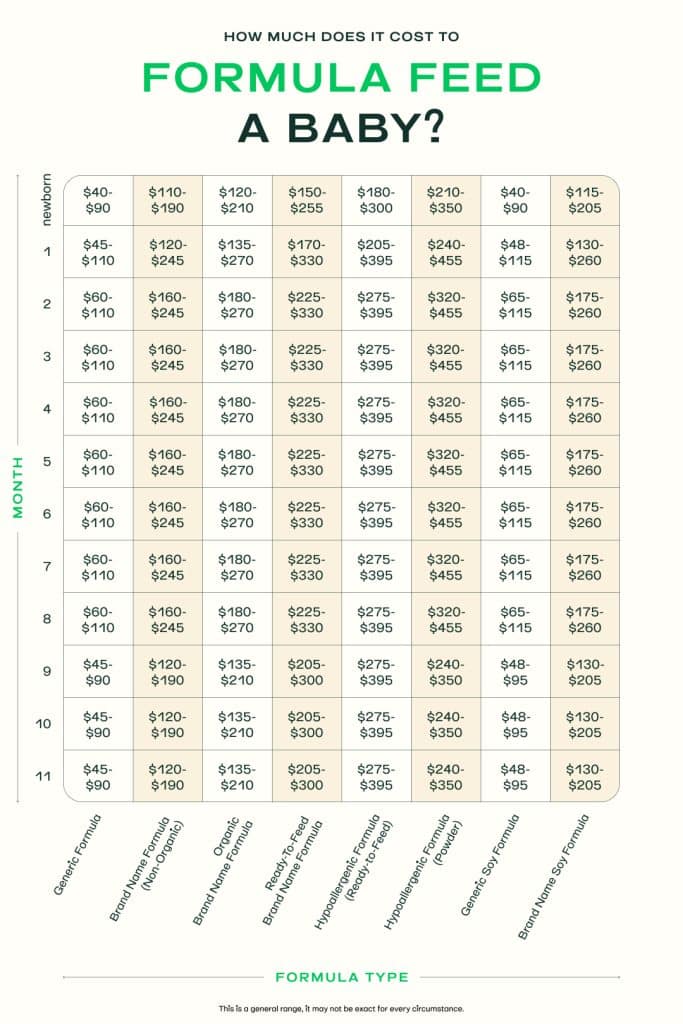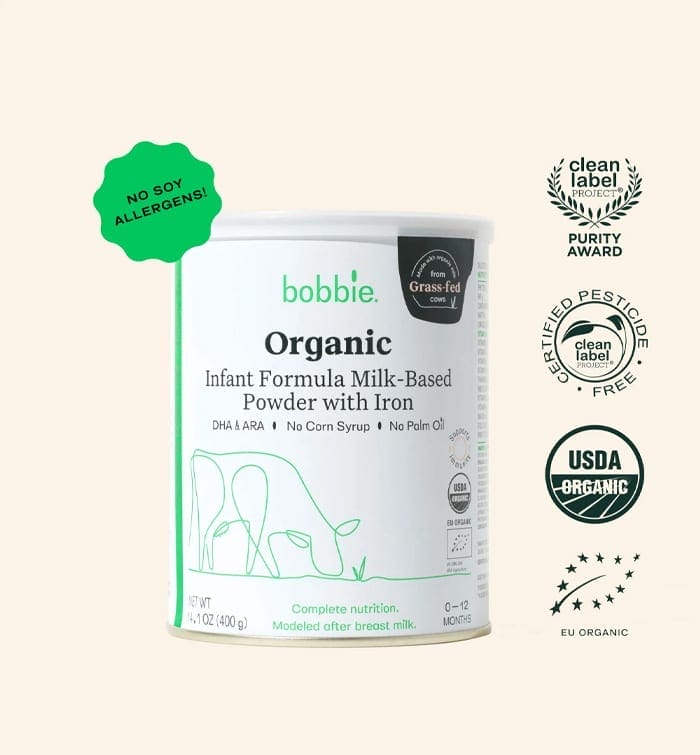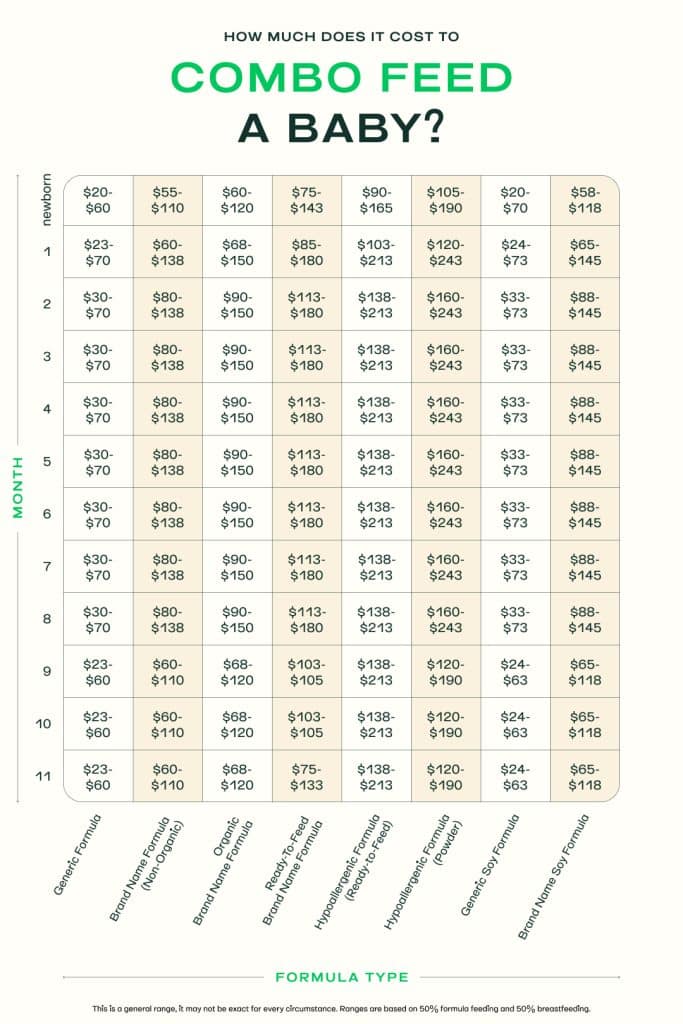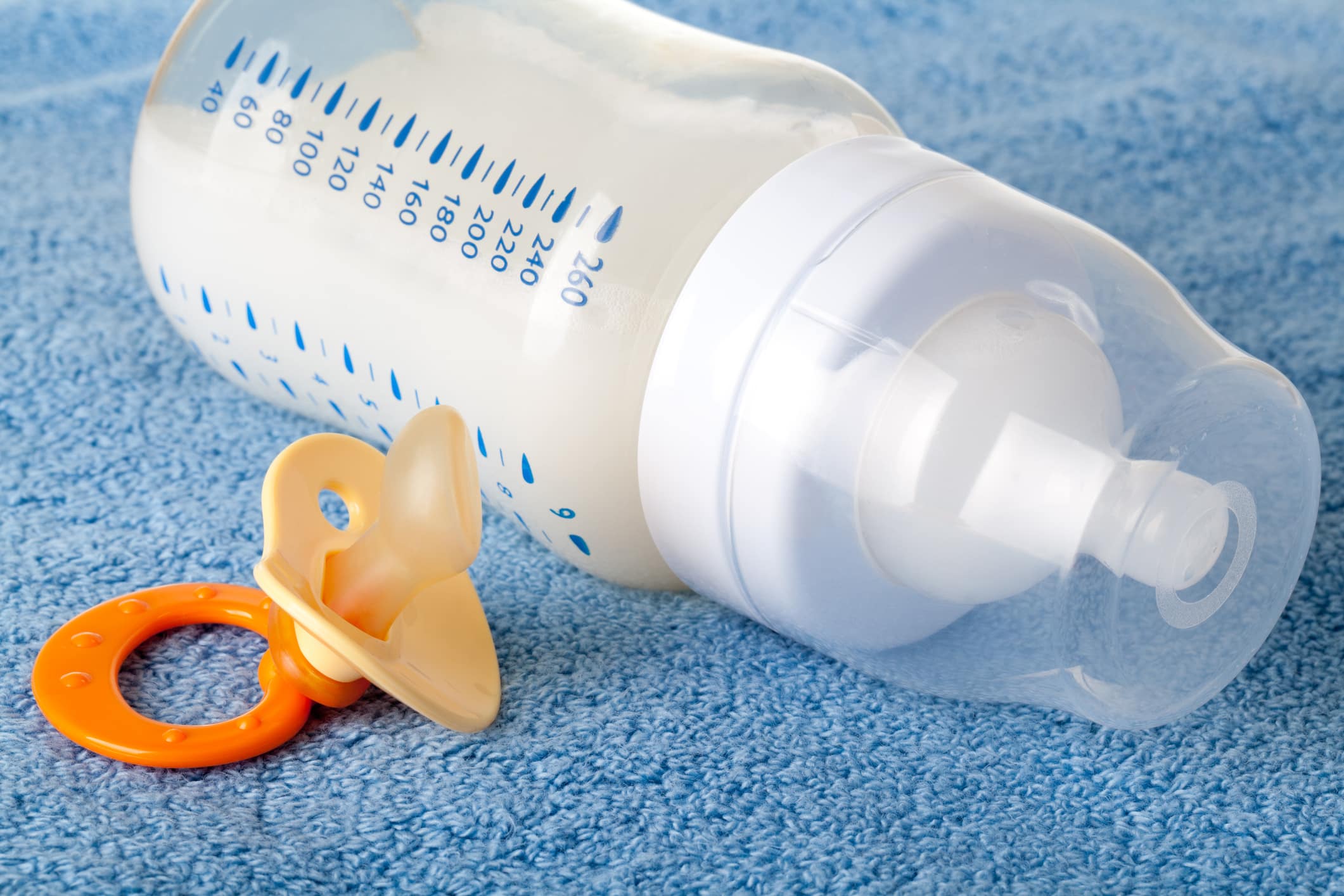We are proud to say that these posts are not sponsored. Our editorial team of Bobbie moms and writers personally select each featured product. If you buy something through our links, we may earn an affiliate commission, at no cost to you.
Not surprisingly, having a baby comes with a number of costs: from the best baby swings to the best stroller wagons to car seats and more. But it’s not just the baby registry items that add up. If you’re planning to formula feed or combo feed your little one, the cost of feeding your baby is another expense to plan for.
Baby formula can cost $1000 or more for a baby’s first year, according to the U.S. Surgeon General. In reality, the expense can be much higher depending on your baby’s needs and your formula preferences. It’s important to know how much formula costs per month and what that adds up to be for your baby’s first year. It’s also important to address the cost of breastfeeding vs formula. These may not have been things you thought about while you were pregnant, but it’s important that we get it all on the table.
- How Much Does Baby Formula Cost?
- Why Are Some Baby Formulas More Expensive?
- Cost of Breastfeeding vs Formula
- How Much Does Baby Formula Cost Per Month?
- Newborn Feeding Cost per Month
- 1 Month-Old Feeding Cost per Month
- 2 Month-Old Feeding Cost per Month
- 3 Month-Old Feeding Cost per Month
- 4 Month-Old Feeding Cost per Month
- 5 Month-Old Feeding Cost per Month
- 6 Month-Old Feeding Cost per Month
- 7 Month-Old Feeding Cost per Month
- 8 Month-Old Feeding Cost per Month
- 9 Month-Old Feeding Cost per Month
- 10 Month-Old Feeding Cost per Month
- 11 Month-Old Feeding Cost per Month
- 12 Month Old Feeding Cost
- Baby Formula Cost
How Much Does Baby Formula Cost?
The cost of baby formula ranges significantly. Store shelves are lined with brand name or generic formula, organic baby formulas and non-organic formulas, ready-to-feed or powder formula, hypoallergenic, soy formula and so much more. Whew—that’s a lot. Let’s break it down.
On the more budget-friendly side, you can opt for generic, or store brand formula, which is just as highly-regulated as brand name options. A 35-ounce container of generic formula can cost around $19.99.
Non-organic brand name powdered baby formula will typically range from $50 to $55 for 35 ounces, while a brand name organic powder formula can range from $40 to $50+ for 28 to 32 ounces.
For ultimate convenience, ready-to-feed formula doesn’t require adding any water, but comes at a cost of $9 to $10 for 32 fluid ounces. The AAP recommends that most babies eat no more than 32 ounces a day, so this could quickly add up to $70 a week.
Hypoallergenic formula for babies with cow’s milk allergies or other specific nutritional needs, rings up even higher around $11 to $14+ for 32 fluid ounces.
And finally, if your pediatrician recommends soy formula for any reason, it can range from $22 for 36 ounces to $36 for 21 ounces depending on whether you opt for generic or brand name, organic or non-organic.
Why Are Some Baby Formulas More Expensive?
Baby formula is strictly regulated in the U.S. by the Food and Drug Administration (FDA), which sets rules around its nutrients and vitamins, as well as how it is manufactured and labeled.
Brand name formulas typically cost more than generic ones. Formulas that are made in the U.S., use organic or premium ingredients, or are specialized for nutritional needs also cost more.
That said, you can rest assured that while all formulas will have minor differences, all U.S. formulas contain FDA required ingredients.
Cost of Breastfeeding vs Formula
Combo feeding is a mix of breastfeeding and formula feeding, in whatever combination works best for you. Some people breastfeed in the day and formula feed at night. Others breastfeed as much as possible, and supplement with formula. Yet other parents formula feed while at work and breastfeed while at home. Combo feeding works best however it works best for you and your family.
How Much Does Baby Formula Cost Per Month?
The monthly cost of feeding your baby* will range based on what kind of formula you use, how much your baby eats and— if you’re combo feeding— how often you’re breastfeeding vs. formula feeding. Then this cost is based on your type of formula (powder, concentrate or ready to feed) and your brand of choice.


Shop Bobbie Organic Infant Formula
Bobbie Organic Infant Formula is a USDA Organic, EU-style infant formula that meets all FDA requirements. It is a complete nutrition milk-based powder modeled after breast milk and is easy on tummies. It is non-GMO and doesn't have corn syrup, palm oil, or maltodextrin. Learn more about Bobbie.

Newborn Feeding Cost per Month: $20 – $200+
Most newborns eat every 2-3 hours around the clock. In the first few days of life, they may only take a half ounce per feeding, but by 2-weeks-old, they’ll be eating around 2-3 ounces per feed, according to the American Academy of Pediatrics.
1-Month-Old Feeding Cost per Month: $20-$250+
A 1-month-old may eat anywhere from 3-4 ounces every 3-4 hours. In general, as told by the AAP, babies don’t need more than 32 ounces of formula in 24 hours.
2-Month-Old Feeding Cost per Month: $30-$250+
Two-month-old babies usually eat 4 to 5 ounces per feeding every 3 to 4 hours, according to the AAP.
3-Month-Old Feeding Cost per Month: $30-$250+
A three-month-old baby will typically eat between 24-32 ounces a day. This may look like 4-6 ounces every three hours.
4-Month-Old Feeding Cost per Month: $30-$250+
Four-month-old babies usually eat about 4-6 ounces per feeding, around every three hours.
5-Month-Old Feeding Cost per Month: $30-$250+
At five-months-old, most babies eat about 5-7 ounces per feeding.
6-Month-Old Feeding Cost per Month: $30-$250+
At 6-months old, babies may eat up to 8 ounces every four to five hours. Since many babies are sleeping longer periods at night, this equals about 24 to 32 ounces a day. The AAP recommends introducing solids at 6-months, but breast milk or formula will still be their primary source of nutrition.
7-Month-Old Feeding Cost per Month: $30-$250+
Most babies will increase the amount of formula they drink by an average of 1 ounce each month before leveling off at about 7 to 8 ounces per feeding, with no more than 32 ounces a day.
8-Month-Old Feeding Cost per Month: $30-$250+
An 8-month-old baby will likely be eating between 24-32 ounces a day.
9-Month-Old Feeding Cost per Month: $20-200+
At 9-months-old, solid food is taking up more of a baby’s diet, but they should still be getting roughly 24 ounces of formula per day.
10-Month-Old Feeding Cost per Month: $20-200+
About 400 to 500 calories of a 10-month-olds daily diet should come from breast milk or formula— about 24 ounces.
11-Month-Old Feeding Cost per Month: $23-200+
At 11 months, a baby will continue to have about 24 ounces of breast milk or formula daily. When they turn 12-months, most pediatricians will recommend switching over to cow’s milk.
12 Month Old Feeding Cost
At the one year mark, you are able to switch over to whole milk and solid foods. Speak to your pediatrician to figure out the best feeding plan for you and your family. At 12 months, formula is no longer required or recommended, so the costs of food are based on your milk and food choices.
Baby Formula Cost
Getting ready to welcome a baby can be both exciting and stressful. Planning ahead for expenses can help, but as you can see, the cost of feeding a baby for the first year is a wide range. With baby formula being one of the most tightly regulated food products in the U.S., you can feel confident in making the right choice for your family and baby’s needs— no matter which direction you go.

Shop Bobbie Organic Infant Formula
Bobbie Organic Infant Formula is a USDA Organic, EU-style infant formula that meets all FDA requirements. It is a complete nutrition milk-based powder modeled after breast milk and is easy on tummies. It is non-GMO and doesn't have corn syrup, palm oil, or maltodextrin. Learn more about Bobbie.
*Please note the prices above are general ranges, they are not exact for each circumstance.

